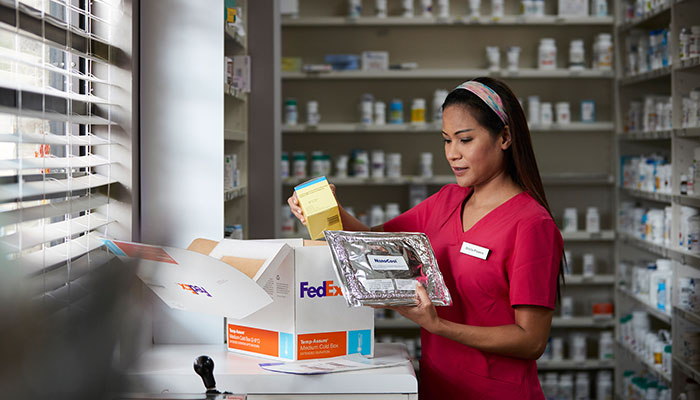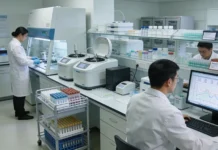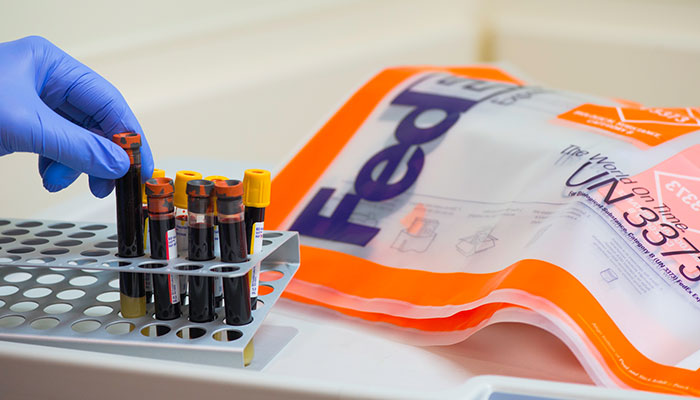Combining the power of network with data paves the way for better logistical support for healthcare players.
The latest wave of COVID-19 infections has made its way across East Asia, with Hong Kong[1], Shanghai[2] and Beijing[3], reporting record numbers of daily cases since the start of the pandemic. Like the response to previous waves, adequate and regular supplies of COVID-19 vaccines, diagnostic test kits, and other personal anti-epidemic equipment are needed to help the work toward cutting transmission chains among the population. However, at the same time, the global supply chain faces a monumental challenge hampered by one of the world’s most stringent zero-COVID measures in China[4], the world’s largest manufacturer of goods.[5]
The impact of the COVID-19 restrictions and the rise in e-commerce[6] have squeezed the global healthcare supply chain. Building a more resilient network of logistics centers and storage facilities has therefore become an imperative for many logistics services providers. So, how can logistics providers address the new challenges healthcare customers are facing today?
Shortage of cold-chain storage facilities hinders mass immunization
Immunization against COVID-19 is essential to overcoming this pandemic. The World Health Organization (WHO) has set a global target of immunizing 70% of the world’s population by June of this year[7], a target date that is fast approaching. However, only about 60% are currently fully vaccinated[8].
In Asia, where nearly two-thirds of the world’s population reside, the lack of cold chain storage facilities has been a challenge that hinders mass vaccination efforts. Many developing countries in the region still lack the infrastructure to stockpile vaccines, particularly ones that require extremely low temperature storage.[9]
Cold chain storage serves as the backbone of global vaccination as it provides the basis for effective vaccine inventory management. The ability to stock vaccines, preserve their efficacy and reduce wastage of shots allows countries to implement comprehensive immunization programs. To enable this, logistics providers have been partnering up with national governments and local healthcare authorities and clinics to establish supply lines and respond swiftly whenever an outbreak arises.
For decades, FedEx has been able to leverage its cold chain network to ship vaccines, biologics, and medical aid across five continents. In the past three years, the company added more than 10 additional facilities to its network, including three key Life Science Centers in Asia – South Korea, Japan and Singapore, to provide extensive capabilities to support cold chain logistics in the region, including round-the-clock temperature monitoring and contingency cold rooms at several air cargo gateways.[10] To strengthen the global healthcare supply chain and become more pandemic-resistant, Asia’s logistics sector will need to expand its current cold chain infrastructure to better meet unforeseen demand surge in the future.
Imbalance of demand and supply due to compressed supply chain capacity
The latest data released by the International Air Transport Association (IATA) [11] reveals the impact of the Omicron variant in Asia, the zero-COVID policy in China and Hong Kong, and the Russia-Ukraine conflict has led to a decline in both air cargo volume and available capacity of 5.1% and 6.4% year-on-year for the APAC region, the largest drop among all regions. Asian countries make up half of the world’s top 10 manufacturers, of which China is responsible for nearly one-third of the global output.5 The Omicron resurgence in China has inevitably put strains on global supply chains.
The good news is, despite these headwinds, the need for vaccines, treatments, diagnostic tests, and protective equipment has not waned thanks to the strong production capabilities within the Asia markets. It’s encouraging to see China and India now leading the world in the production of personal protective equipment[12], and Indonesia is becoming a major manufacturing hub for mRNA-based vaccines according to the WHO.[13] The challenge for logistics providers is to navigate demand fluctuations of the healthcare supply chain and other types of shipments (such as e-commerce shipping), and consistently deliver for both.
Since the start of the pandemic, FedEx has been actively flexing its network and overall capacity to ensure the distribution of life-saving healthcare and pharmaceutical supplies will not be compromised while the company continually supporting growing demands of e-commerce shipments across the globe. In September last year, the company added six new intercontinental flights with an added capacity of nearly 2,700 tons each week. While global supply chain disruptions persist, logistics providers need to work toward expanding their shipping capacity and strengthen their network to alleviate delivery bottlenecks for businesses.
Limited healthcare expertise compromises the reliability of delivery services
Supply chain disruptions, coupled with high volumes of shipments and bottlenecks in customs clearance, can easily lead to undesirable situations where packages are being mishandled, delivered to the wrong location, or even lost.[14] In healthcare logistics, failure to deliver the right package to the right location could mean life or death in some cases.
The pandemic has highlighted the limitations and drawbacks of a distribution system that heavily relies on human labor, and consequently a need to explore solutions offered through technology. At the same time, COVID-19 provided impetus for the world to accelerate its digital transformation and has acted as a catalyst for the logistics industry to build smarter supply chains for businesses of all kinds.
Imagine the amount of insights logistics players can gain from scanning approximately 20 million packages everyday through a global network, and each package is scanned multiple times during its transportation. Not only does this allow the company to continuously track and monitor our customers’ assets, but it can also help collect real-time data such as current air cargo traffic, changing weather patterns that could delay shipments, or threaten the integrity of sensitive medical supplies.
That’s exactly what FedEx has been focusing on. Aside from leveraging FedEx Surround, the company’s first customer-facing solution built on AI, machine learning, and analytics to monitor vaccine transportation throughout the pandemic, and providing industry-leading sensor-based tracking solution – FedEx SenseAware ID that delivers real-time updates on a package’s location, FedEx recently forged a collaboration with Microsoft to transform its healthcare supply chains into more predictive and adaptive, enabling customers with more visibility into shipping capacities, delivery lead times, warehouse inventory levels and more, across the whole network.

Resilient supply chains to support future growth
Numerous instances over the past years [15]suggest that resilient supply chains are vital to support global anti-pandemic efforts.
By combining a robust transportation network with technological innovation and human expertise at every step along the supply chain, logistics providers will be well positioned to address the complex and unique challenges healthcare companies face today and, in the future ahead.
To learn more about FedEx healthcare solutions, please visit https://fedexbusinessinsights.com/healthcare/
References:
[1] https://www.reuters.com/business/healthcare-pharmaceuticals/hong-kong-reports-56827-covid-19-cases-new-record-daily-high-2022-03-03/
[2] https://www.reuters.com/world/china/chinas-xi-says-sticking-tough-covid-curbs-will-bring-victory-2022-04-14/
[3] https://www.bloomberg.com/news/articles/2022-04-25/china-races-to-stop-beijing-outbreak-as-shanghai-deaths-climb
[4] https://www.scmp.com/news/china/science/article/3167356/why-china-standing-firm-zero-covid-and-will-it-work-hong-kong
[5] https://www.statista.com/chart/20858/top-10-countries-by-share-of-global-manufacturing-output/
[6] https://www.trade.gov/impact-covid-pandemic-ecommerce
[7] https://www.who.int/director-general/speeches/detail/director-general-s-opening-remarks-at-the-g7-summit—12-june-2021
[8] https://ourworldindata.org/covid-vaccinations
[9] https://www.reuters.com/article/us-health-coronavirus-vaccines-pfizer-as-idUKKBN27Q1G1
[10] APAC Primer Jan2021
[11] https://www.iata.org/en/pressroom/2022-releases/2022-05-03-01/
[12] https://www.thehindu.com/news/national/india-becomes-worlds-second-largest-manufacturer-of-ppe-body-coveralls-next-to-china-government/article31643400.ece
[13] https://jakartaglobe.id/business/indonesia-set-to-become-mrnabased-vaccine-production-hub-for-southeast-asia
[14] https://www.supplychainquarterly.com/articles/4740-health-cares-last-mile-challenge
[15] https://www.sciencedirect.com/science/article/pii/S1478409222000036





















